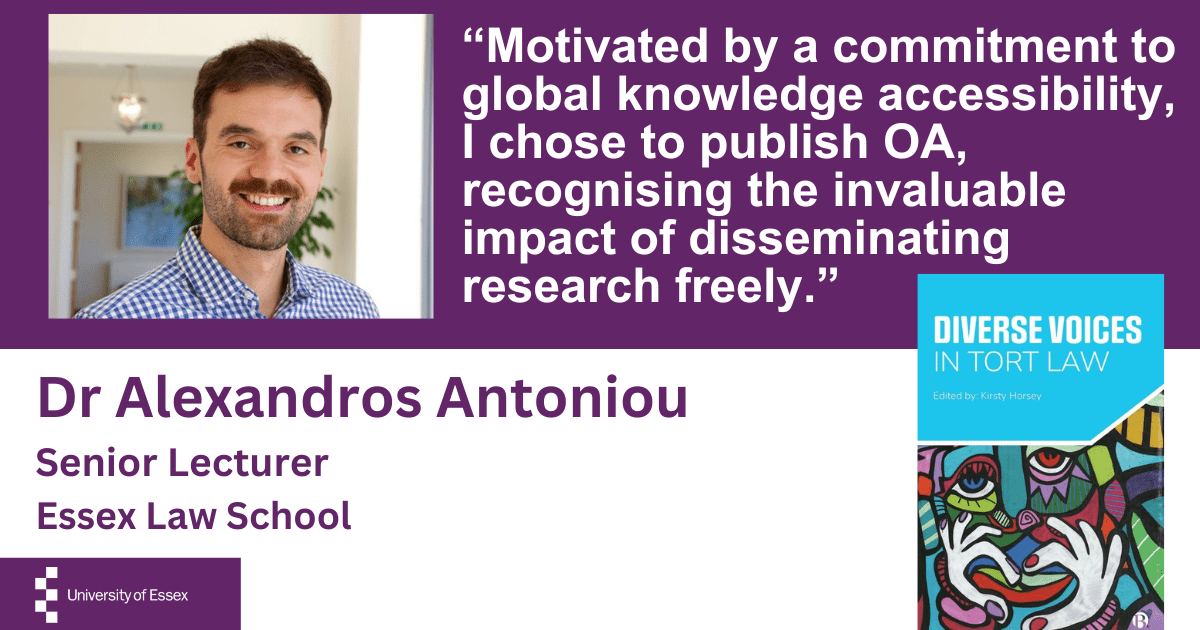Alexandros Antoniou: Q&A on Open Access publication

The Open Access (OA) Team from the University of Essex's Library Services spoke to Dr Alexandros Antoniou, Senior Lecturer in Law, Essex Law School, about his new chapter in Diverse Voices in Tort Law (Bristol University Press, 2024).
Dr Antoniou chose to make use of the University’s Open Access Fund to ensure that his contribution - Homosexuality, Defamatory Meaning, and Reputational Injury in English Law – is now available without restriction to readers everywhere.

OA - Congratulations on the publication of your new chapter! How does it feel to have it published and freely available?
AA - Thank you for your nice words! It’s incredibly fulfilling to see my work published; it’s a validation of the hard work and effort poured into the research and writing process. Knowing that the content is accessible to anyone interested in the topic adds another layer of satisfaction. This accessibility empowers readers to learn and engage with a subject matter that doesn’t feature in mainstream legal analysis, fostering a more informed and inclusive discourse. The opportunity to contribute to the open exchange of legal knowledge is deeply rewarding.
OA - You chose to make use of the University’s Open Access Fund. Why is Open Access important to you and how do you think it will benefit your work?
AA - Embracing Open Access resonates with my commitment to democratising knowledge. By making my chapter freely available, I can broaden its reach, engaging researchers, practitioners, and policy makers as well as individuals who may not have access to academic resources restricted by paywalls. This wider dissemination of my work can significantly enhance its visibility and foster a more inclusive scholarly dialogue.
OA - How did you find the Open Access process?
AA - I thought it was smooth, quite straightforward, and very efficiently managed. The University’s dedicated support team made it easy for me to navigate the steps involved in making my work openly accessible. Overall, it was a very positive experience and I’m glad I chose to explore this avenue.
OA - What advice about Open Access, or publishing in general, would you offer to colleagues?
AA - I would encourage colleagues to consider the benefits of Open ccess publishing, both for their own work and the wider academic community. Embracing open access can increase impact and amplify the reach of our research beyond traditional academic circles.
OA - Now, about your chapter: please give us a quick overview. Will it be a part of any courses you teach?
AA - In this chapter, my co-author and I delve into the intricacies of English defamation law, particularly concerning false imputations of homosexuality both pre and post the 2013 libel reforms. The central question we seek to answer is: should the publication of a statement falsely labelling someone as homosexual warrant a defamation lawsuit?
Taking an interdisciplinary approach, our analysis traces the evolution of societal norms and key legislative changes that have influenced the trajectory of the LGBT movement in England. By examining key events and relevant case law, we evaluate the degree to which reputational harm resulting from being misidentified as gay or lesbian should be acknowledged within the legal framework.
As for the chapter’s inclusion in courses I teach, it is certainly a priority!
The chapter features in the Diverse Voices in Tort Law collection. The Diverse Voices series is a pioneering platform dedicated to examining the impact of the law on marginalised groups, including the LGBTQ+ community. It seeks to provide scholars, researchers, and students with an opportunity to engage with voices that have often been overlooked or silenced.
The research conducted for my chapter on defamation aims partly to uncover the power imbalances that underpin defamation law decisions. It promises to captivate not only those studying the law but also those interested in areas pertaining to LGBT rights. By introducing readers to perspectives that are often absent from conventional discourse, the chapter will no doubt enrich and revitalise the study of law and LBGT issues.
OA - What’s next for you? Do you have new projects lined up?
AA - I am researching communications law, broadly understood. While I find all of its aspects intriguing, my interest gravitates towards the complexities surrounding offensive and harmful content within advertising. My next adventure is about the regulatory parameters surrounding controversial advertising campaigns and attention-grabbing marketing tactics. I aim to examine where the boundary lies between commercial messaging that may be deemed uncomfortable or questionable, and messaging that crosses into impermissible territory. I am committed to sharing the findings of my next project in an open access format to facilitate broader dissemination and engagement with interested stakeholders.
Bibliography
- Homosexuality, Defamatory Meaning and Reputational Injury in English Law, by Alexandros Antoniou (Essex Law School, University of Essex) and Dimitris Akrivos (University of Surrey).
- Chapter 9 in Diverse Voices in Tort Law (Bristol University Press, 2024).
The Open Access Fund
The University’s institutional Open Access Fund, managed by the Library's Research Support Team, enables Essex authors to publish as much research as possible open access. If you want to explore Open Access options please start by completing our enquiry form.




